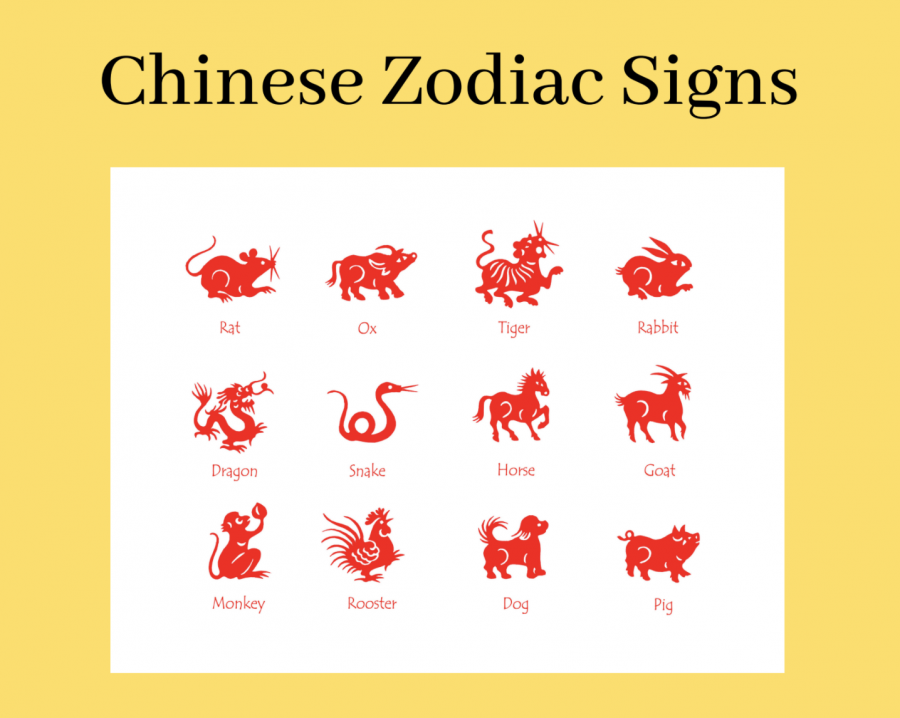ZONING IN ON ZODIACS
A Look Into The History of The Chinese Zodiac Signs
Have you heard the story of The Great Race? Do you know your Chinese zodiac sign? Stick around and learn a little bit about this Chinese legend!
The Great Race Story
There are many versions of this story, but I will be focusing on the one that was taught to me in my Chinese class.
Long ago the Jade Emperor, Ruler of heaven, created a competition- the first twelve animals to reach his palace would get a spot on the lunar calendar. As you can imagine, the animals were thrilled to be presented with such an opportunity.
There were two animals, in particular, who already had a plan on how to win. The Cat was not a morning person, so the Rat promised to wake him up before the race. The Rat and Cat were best friends and wanted to finish the race together, the Cat in first place and the Rat in second. Maybe you can see where this is headed. The next morning the Rat betrayed his promise and didn’t wake up the Cat. Because of this, the Cat didn’t even get a spot on the calendar. Some say this is where the hatred between cats and rats derived from.
There was one part of the race the Rat was worried about- the river. It was right before the end; the only thing that stood in his way. He wasn’t a good swimmer and he couldn’t find another way to cross the water. Once reaching the rushing river the Rat realized the Ox was just about to cross as well. After some persuasion, the Rat was able to hitch a ride on the Ox across the river. As soon as they reached the other side, the Rat jumped off the Ox and sprinted ahead towards the finish line. The Ox, a little slower, ended up in second place and the Rat, only because of the Ox’s kindness, ended up being the first zodiac sign.
The next two animals to arrive were the Tiger and the Rabbit; both had trouble crossing the river, but they managed to secure third and fourth place. Not too long after, the Dragon arrived, becoming the fifth zodiac sign. The Dragon had quite the advantage, being able to fly and all, but he had stopped to help a village in need of rain. This is why the Dragon is considered one of the “best” signs and is so highly valued. Soon after, the Horse was seen galloping towards the finish line. Unknown to everyone, the Snake had managed to secretly travel on the Horse. His sudden appearance startled the Horse giving the Snake sixth place and the Horse seventh.
The next three animals were unique; they worked together throughout the race. The Rooster, Monkey, and Goat found a raft to use instead of swimming across the river. The Jade Emperor complemented their teamwork, giving the Goat eighth place, the Monkey ninth, and the Rooster tenth. The last two animals got distracted along the way. The Dog, coming in eleventh, stopped to play in the river, enjoying the cool water on such a hot day. And the pig, arriving in last, paused to eat and sleep. With the twelfth place claimed, the race ended and the twelve zodiac signs were declared.
The Chinese Zodiac Signs
Now on to what some might say is the “fun” part. Depending on your birth year, you are one of the twelve animals. Each animal, similar to astrological signs (ex. Virgo), has specific traits. If you want to learn more about your sign, you can go to this article, written by Fefe Ho.
Each sign repeats every twelve years. Since sometimes people give their Chinese zodiac sign instead of their birth year, the gap can create some confusion. For instance, if an older person said they were born in the year of Rat, they could be 85 or 73 or 61 or even younger. This is where elements come in; there are five elements that repeat every nine (maybe eight) years. The five elements are Wood, Fire, Earth, Metal (Gold), and Water. I’m slightly embarrassed to admit it took me hours to fully understand how the animals and elements coexisted; I ended up making this spreadsheet just to visualize what was going on. The older person sensing your confusion clarifies that they’re a Fire Rat. Since the exact pair (sign and element) only repeats once every 60 years, you can easily narrow down their age. The only two reasonable years of the Fire Rat are 1996 and 1936. Given that they’re an older person, they were probably born in 1936 making them 85 years old.
iUPrep Students
That was just a hypothetical situation, now onto a couple of actual scenarios. Two people on the form I sent out included their element along with their animal. Nick, a 7th grader, said they were an Earth-Ox. This means, realistically, they were either born in 1949 or 2009. Katelyn Solis, a fifth-grader, said they were a Golden Rabbit (sometimes Gold is used to replace Metal). The two most recent Metal Rabbit years occurred in 2011 and 1952. From here we can make a logical guess as to which year they were each born. As you can see, the element really helps narrow down the possibilities.
The form that I sent out included general information regarding Chinese zodiac signs. I really appreciate the twenty-three people who took time out of their day to answer my questions! When asked if the students knew their sign, over 60% of them said they did, and 22% of them said they had heard of Chinese zodiac signs but didn’t know their animal. The majority of students were born in the years of Ox and Tiger. Logically this works, since most of the students that filled out the form were 6th and 7th graders.
Around The World
An article written in Priceonomics in 2015 analyzed different Asian countries and their biases towards certain signs. They said, “It might seem silly to those of us outside the culture, but Chinese astrology has very real demographic effects.” Taiwan’s birth rates tend to drop during the years of the Tiger. An article from the Asia Times says, “(someone born in the year of Tiger) tends to question authority and is therefore likely to cause trouble for himself (themselves), his (their) family or to his (their) employers at some stage of life.” Now, this doesn’t mean that being born in the year of the Tiger is a bad thing, I personally think that questioning authority is an awesome trait to have.
While South Korea has no negative biases towards the Tiger, it is considered unlucky for a female to be born in the year of Horse. Jungmin Lee and Myungno Paik wrote a research paper on the birth rates in South Korea and some of their neighboring countries. It was discovered that parents lie about their female child’s date of birth just so no one thinks they were born in the year of the Horse. The authors say, “According to zodiac astrology, the Horse is generally believed to symbolize masculinity. It is energetic and optimistic and has high spirits. As such, the Horse implies undesirable traits for women as wives.” This article is already long so I’m not going to bore you with my opinions on this quote, but maybe you can see the problem. Since the year of Snake is right before the year of Horse, many parents say their female child was born in the year of Snake, which leads to false birth statistics.
The Dragon zodiac sign is universally favored by most countries. Often people will try to time their pregnancy so that their child is born in the year of Dragon. With traits like good leadership, intelligence, ambition, and authority, it’s understandable why some might prefer their child to have the Dragon sign.
Most western countries don’t put any significance on Chinese zodiac signs, so there’s no need to worry too much about yours! This being said, it’s important to remember that some societies are heavily impacted by Chinese zodiac signs. Even though your sign doesn’t hold much meaning in the United States, it’s still valuable to learn about the history that surrounds the Chinese zodiac animals.
Sources:
“The Great Race – Origins of the Chinese Zodiac.” ImmerQi, 6 Dec. 2017, https://immerqi.com/blog/great-race-origins-chinese-zodiac/
Ho, Fefe. “Chinese Zodiac: 12 Animal Signs, Compatibility, Horoscopes.” Chinese New Year, https://chinesenewyear.net/zodiac/
“How the Chinese Zodiac Affects National Birth Rates.” Priceonomics, 24 Feb. 2015, https://priceonomics.com/how-the-chinese-zodiac-affects-national-birth/
Jiang, Fercility. “Chineses Five Elements Philosophy and Culture.” Chinese Five Elements Philosophy and Culture, 2 Oct. 2021, https://www.chinahighlights.com/travelguide/chinese-zodiac/china-five-elements-philosophy.htm
Lee, Jungmin, and Myungho Paik. “Sex Preferences and Fertility in South Korea during the Year of the Horse.” Demography, vol. 43, no. 2, 2006, pp. 269–292., https://doi.org/10.1353/dem.2006.0015
Wright, Jaime. “Chinese Zodiac Elements: How to Know What Yours Is and What It Means.” PureWow, PureWow, 13 Nov. 2020, https://www.purewow.com/wellness/chinese-zodiac-elements
Hi, my name is Keeley! I am so excited to be apart of iHoot as the Special Section Editor this year!

Hello everyone! My name is Alessandra Gonzalez and I am an eleventh-grader at iUniversity Prep. This will be my 5th year attending online school. I love...







